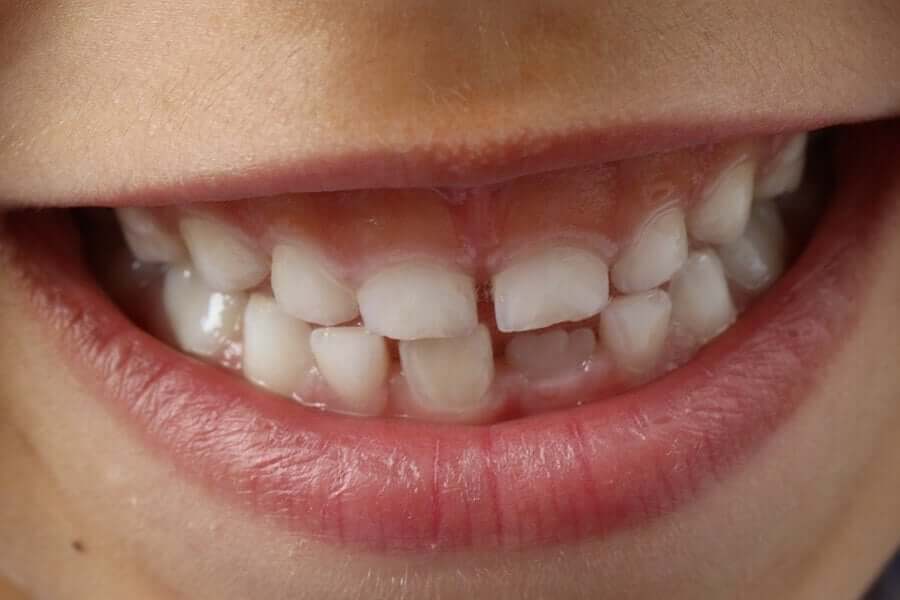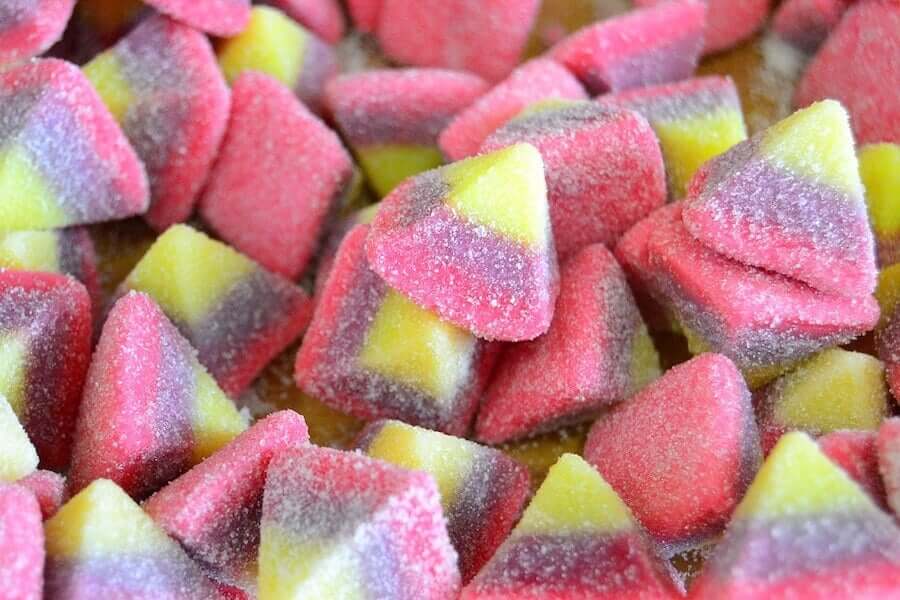Junk Food and Cavities: An Unhealthy Combination

Sweets are a delicious treat when consumed carefully. However, eating sweets too often can quickly lead to cavities. Fortunately, we can avoid this kind of damage to our teeth – especially in children – by following the simple tips below.
Sweets come in all shapes and sizes. Unfortunately, though, these delicious treats are full of sugar or sucrose, as well as other additives that can lead to the growth of bacteria. These substances destroy dental tissue and cause pain and swelling… Sometimes so severe that going to the dentist as soon as possible is unavoidable.
Junk food and oral health
It’s important to understand how eating sweets affects oral health. Streptococcus mutans, known as biofilm, is the bacteria responsible for plaque and cavities. It feeds on sugar, which favors its reproduction, adhering to dental enamel and destroying it. This leads to cavities and other problems as well.

Artificial fruit juices and soft drinks act in the same way as sweets when children consume them between meals. At breakfast, lunch and dinner, saliva forms and rinses the mouth out, reducing the amount of time that sugar remains on the teeth.
Other foods that contain protein and fat increase PH and reduce acidity, which minimizes aggression to enamel. However, consuming sweets, soft drinks and artificial juices between meals means that sugars remain on the teeth for more time, causing more damage. Brushing teeth after consuming these items will make the sugar disappear.
When a tooth loses its enamel, it loses its protection. As a result, it remains exposed, making it more prone to cavities and stains. This also increases its sensitivity to heat and cold.
Be careful with sour sweets
If sweets are also sour, then the risk is double. They can dissolve tooth enamel. What’s worse is that the germs appear just the same, due to the presence of sugar in these candies, causing even more damage.
You can tell a candy is sour not just by its flavor – you can also read it on the packaging. If you notice names like lactic acid, ascorbic acid, phosphorous acid or citric acid, it’s best to stay away. Phrases like fruit extract and vitamin C on candies are also indicators of the presence of some acid, so it’s better to avoid them.
Furthermore, if candies are sweet, sour and sticky and chewable, then the risk is threefold. These products easily stick to the surface of teeth and are difficult to remove with saliva. As long as they remain stuck on teeth, they’ll continue to contribute to the formation of bacteria.
Tips for saying goodbye to cavities
It’s okay to consume sweets in moderation and carry out certain habits that help preserve dental health. Don’t forget that excessive sweets aren’t just an oral health issue – they also contribute to serious health issues, such as diabetes and obesity.
Proper oral hygiene
It’s important to brush teeth 20 minutes after eating sweets, especially if they’re sour, sticky or chewable. This waiting period is important in order to avoid rinsing away tooth enamel that has been weakened by acids.
If tooth brushing isn’t an option at the time, then you should at least rinse out your mouth with water. This will momentarily stop the damage of acids to your teeth.
Xylitol for eliminating acidity
If you’re excessively dependant on sweets, then sugar-free gum is an option. They possess sugar alcohol called xylitol with counteracts bacteria. This way, you neutralize the effect of excessive acidity just as well as if you drink a glass of milk or eat a piece of cheese.

See a dentist
An annual visit to the dentist, or every 6 months if possible, is extremely beneficial when it comes to maintaining optimal oral health. A dentist will be able to detect the onset of any illness and offer advice as to how to keep teeth in perfect shape.
It’s okay to treat yourself every once in a while, but it’s important not to allow eating sweets to become a habit. Junk food and cavities often come hand in hand if you don’t take proper precaution. However, if you avoid excessive sweets, you’ll preserve your own dental health and nutrition as well as that of your children.
Sweets are a delicious treat when consumed carefully. However, eating sweets too often can quickly lead to cavities. Fortunately, we can avoid this kind of damage to our teeth – especially in children – by following the simple tips below.
Sweets come in all shapes and sizes. Unfortunately, though, these delicious treats are full of sugar or sucrose, as well as other additives that can lead to the growth of bacteria. These substances destroy dental tissue and cause pain and swelling… Sometimes so severe that going to the dentist as soon as possible is unavoidable.
Junk food and oral health
It’s important to understand how eating sweets affects oral health. Streptococcus mutans, known as biofilm, is the bacteria responsible for plaque and cavities. It feeds on sugar, which favors its reproduction, adhering to dental enamel and destroying it. This leads to cavities and other problems as well.

Artificial fruit juices and soft drinks act in the same way as sweets when children consume them between meals. At breakfast, lunch and dinner, saliva forms and rinses the mouth out, reducing the amount of time that sugar remains on the teeth.
Other foods that contain protein and fat increase PH and reduce acidity, which minimizes aggression to enamel. However, consuming sweets, soft drinks and artificial juices between meals means that sugars remain on the teeth for more time, causing more damage. Brushing teeth after consuming these items will make the sugar disappear.
When a tooth loses its enamel, it loses its protection. As a result, it remains exposed, making it more prone to cavities and stains. This also increases its sensitivity to heat and cold.
Be careful with sour sweets
If sweets are also sour, then the risk is double. They can dissolve tooth enamel. What’s worse is that the germs appear just the same, due to the presence of sugar in these candies, causing even more damage.
You can tell a candy is sour not just by its flavor – you can also read it on the packaging. If you notice names like lactic acid, ascorbic acid, phosphorous acid or citric acid, it’s best to stay away. Phrases like fruit extract and vitamin C on candies are also indicators of the presence of some acid, so it’s better to avoid them.
Furthermore, if candies are sweet, sour and sticky and chewable, then the risk is threefold. These products easily stick to the surface of teeth and are difficult to remove with saliva. As long as they remain stuck on teeth, they’ll continue to contribute to the formation of bacteria.
Tips for saying goodbye to cavities
It’s okay to consume sweets in moderation and carry out certain habits that help preserve dental health. Don’t forget that excessive sweets aren’t just an oral health issue – they also contribute to serious health issues, such as diabetes and obesity.
Proper oral hygiene
It’s important to brush teeth 20 minutes after eating sweets, especially if they’re sour, sticky or chewable. This waiting period is important in order to avoid rinsing away tooth enamel that has been weakened by acids.
If tooth brushing isn’t an option at the time, then you should at least rinse out your mouth with water. This will momentarily stop the damage of acids to your teeth.
Xylitol for eliminating acidity
If you’re excessively dependant on sweets, then sugar-free gum is an option. They possess sugar alcohol called xylitol with counteracts bacteria. This way, you neutralize the effect of excessive acidity just as well as if you drink a glass of milk or eat a piece of cheese.

See a dentist
An annual visit to the dentist, or every 6 months if possible, is extremely beneficial when it comes to maintaining optimal oral health. A dentist will be able to detect the onset of any illness and offer advice as to how to keep teeth in perfect shape.
It’s okay to treat yourself every once in a while, but it’s important not to allow eating sweets to become a habit. Junk food and cavities often come hand in hand if you don’t take proper precaution. However, if you avoid excessive sweets, you’ll preserve your own dental health and nutrition as well as that of your children.
All cited sources were thoroughly reviewed by our team to ensure their quality, reliability, currency, and validity. The bibliography of this article was considered reliable and of academic or scientific accuracy.
- Cnpa. Azúcar y caries. http://www.cnpa.com.ni/assets/archivos/caries.pdf
This text is provided for informational purposes only and does not replace consultation with a professional. If in doubt, consult your specialist.








